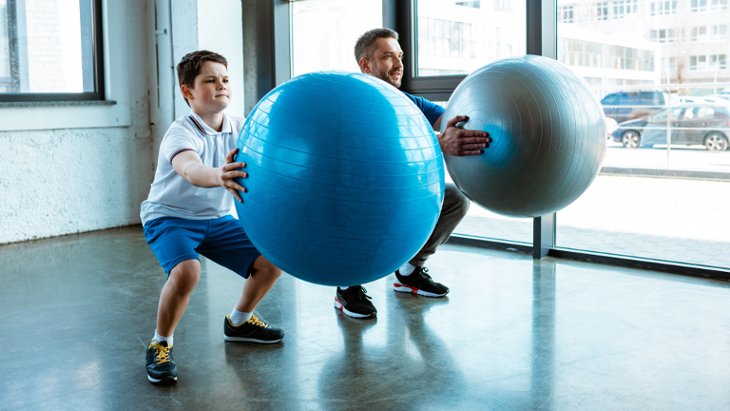 Vampire Weekend's Surprising Jewish Stories
Vampire Weekend's Surprising Jewish Stories


4 min read
Sometimes the lightest objects can become unbearable burdens. It's all about how we carry that ball.
Our Pilates instructor took out a bag of brand-new balls. As she tossed one to each of us, we playfully squished the light, spongy balls.
We were instructed to stand with our arms held out to the sides, like a T, our palms facing skyward. We each held a ball on one palm, while the other hand remained empty. Then we were told to lift the arm with the ball – without bending that arm and without dropping the ball. The other arm was to remain outstretched and straight while we were doing this.
The first several lifts were easy. But soon the happy chatter ceased. Everyone focused inward. The spongy balls felt like cement. "These feel heavier than weights!" one woman called out. Amidst a cacophony of grunts and groans, another woman asked when we would be finished.
As my own arm began to feel more tired than it had ever felt before, I reflected on the irony of the whole thing. The lightest object had become unbearably weighty. An easy action had become incredibly burdensome.
When it comes to challenges in life, it's not necessarily the size of the problem, the weight of the burden, or the magnitude of the test that makes it so heavy and so difficult to bear. It's all about how we carry that ball—and how long we have to hold it.
We often have no control over how much time a certain challenge will remain in our lives. But we do have control over how we will carry that burden. Are we holding it far away from ourselves, wishing it would just fall away? Are we using only our weakest muscles or only one arm to bear it? If we can change how we carry life's trials, we can make them so much lighter and easier to endure. Easier said than done, I know …
My acquaintance's husband is sick with cancer. She's been dealing with that challenge on and off for most of the decade, while also raising their kids, holding down a job, and taking care of her many responsibilities. Instead of feeling like a victim of life's unfortunate circumstances, she has grown tremendously as a person by focusing on the blessings in her life and encouraging others in similar situations. She looks for opportunities to help others in whatever ways she can, usually by offering advice and information to the many people who seek her out. She has learned to ask for help when she needs it, hire out jobs she can't do, and to improve her own life by pursuing personal interests and furthering her education.
Another friend has dealt with years of unemployment and a series of job failures. Yet she constantly works on building her faith in God's goodness and her trust in Him by reading books on these topics, speaking to those who are wiser than her, going to classes that give her encouragement, and reaching out to friends for emotional support.
I look at these inspirational peers and at my own challenges, which are smaller but feel oh so heavy. And I know I need to adjust the way I'm carrying my own difficulties.
Each of us has within us many powerful spiritual muscles, including gratitude, faith, and trust in God. We just have to find those muscles and enlist them to help us carry the burdens. And if those muscles aren't so strong and developed yet, well, then maybe that's why we were given this ball to carry.
It's not easy to lift that arm and keep the ball in the air, to keep the burden aloft. I know it is incredibly hard, and I know that some challenges are way heavier and bigger than others – and I pray that we should never experience them. But I also know that building muscle is a long, slow process that takes a lot of work. And building spiritual muscle is the work of a lifetime.
If we keep our eye not on the ball – on the burden – but rather on how we're carrying it, we can succeed. Don't drop the ball. Just adjust – and keep lifting. And, hey, do you think you can spot me?
